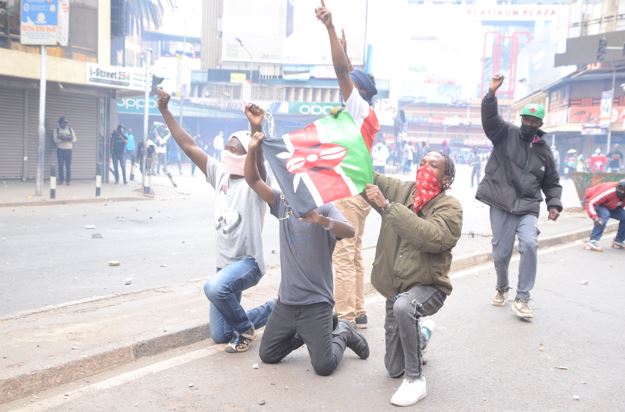

The High Court in Nairobi has ruled
that the police acted unlawfully during last year’s Gen Z protests.
Justice Mugure Thande termed the use
of water cannons, tear gas, rubber bullets, and live ammunition against
demonstrators as unconstitutional and unacceptable in a democratic society.
“A Declaration is hereby issued that
the use of water cannons, tear gas, live ammunition, and rubber bullets, and the
deployment of brute force or any form of violence against persons exercising
their constitutional rights to protest against the Finance Bill, 2024, is
illegal, unconstitutional, and unacceptable in an open and democratic society
like Kenya,” she ruled.
She delivered the judgment on
September 30, 2025, in a petition filed by lawyer and political analyst Saitabao
Ole Kanchory against the Inspector General of Police, the Cabinet Secretary
for Interior, and the Attorney General.
The Independent Policing Oversight
Authority (IPOA) was listed as the fourth respondent, while the Law Society of
Kenya and the Kenya National Commission on Human Rights were interested
parties.
In his petition, Kanchory accused
the State of using “brute force and violence” against peaceful protesters who
had taken to the streets to oppose the Finance Bill 2024.
He said many of the young
demonstrators were unarmed and peaceful, yet they were met with live bullets,
tear gas, and abductions.
“The protesters remained unarmed,
peaceful, and even good-natured but were met with police brutality, extrajudicial
killings, illegal arrests, and torture,” the petition read.
Justice Thande agreed, declaring
that “the use of water cannons, tear gas, live ammunition, and rubber bullets
and the deployment of brute force or any form of violence against persons
exercising their constitutional rights to protest … is illegal,
unconstitutional, and unacceptable in an open and democratic society like
Kenya.”
The court also found that the extrajudicial
killings, abductions, harassment, and intimidation of protesters amounted to
“gross violations of the Constitution.”
“A Declaration is hereby issued that the extrajudicial killings, arrest, abduction, detention, harassment, intimidation, torture, cruel, inhuman, and degrading treatment of persons exercising their constitutional rights to protest against the Finance Bill, 2024 is a gross violation of the Constitution”.
The judgment came after months of
nationwide demonstrations led largely by young Kenyans, popularly known as Gen
Z, who mobilised online to demand accountability and oppose new taxes.
The protests were widely covered,
with videos showing police using excessive force, hooded officers in unmarked
cars, and tear gas being lobbed near medical tents.
In her ruling, Justice Thande cited
evidence from IPOA, which confirmed that police used both rubber and live
ammunition, leading to “serious injuries and fatalities among protesters and
even persons not participating in the protests.”
IPOA said it had investigated 59
deaths and 234 injuries, forwarding some cases to the Director of Public
Prosecutions.
The judge criticised the deployment
of masked police officers and vehicles without registration plates, saying such
practices “militate against the constitutional imperative of transparency and
accountability.”
“There is a saying where I come
from,” Justice Thande ruled, “‘ngari itari namba ni ya muici,’ meaning that a
vehicle without number plates belongs to a thief. The conduct of the police …
is totally unacceptable in a civilized, open, and democratic society like
ours.”
The court further noted that the
National Police Service had violated its constitutional duty to uphold
professionalism, discipline, and human rights.
It emphasised that police are
obligated under Article 244 of the Constitution to “respect human rights and
fundamental freedoms and dignity.”
Kanchory also accused the Inspector
General of taking illegal instructions from the Interior Ministry, undermining
his constitutional independence.
While the court noted that the issue
had been overtaken by events due to leadership changes, Justice Thande
reaffirmed that “the Inspector-General must exercise independent command over
the National Police Service and not take orders from any person or authority.”
Although the petitioner did not
receive costs, the court termed the case a matter of public interest,
saying that awarding costs would “overburden taxpayers.”
The decision is being hailed as a
landmark affirmation of the right to protest in Kenya. Justice
Thande concluded: “The police by
their conduct violated the Constitution, specifically Articles 2, 3, 10, 26,
29, 33, 37, 244 and 245.”
The ruling now sets a powerful precedent for accountability in policing and the protection of the constitutional right to peaceful assembly.








![[PHOTOS] Ruto steps out in full military uniform](/_next/image?url=https%3A%2F%2Fcdn.radioafrica.digital%2Fimage%2F2025%2F10%2F2d04e0da-2f18-42ec-b29a-50a39e262249.jpeg&w=3840&q=100)





